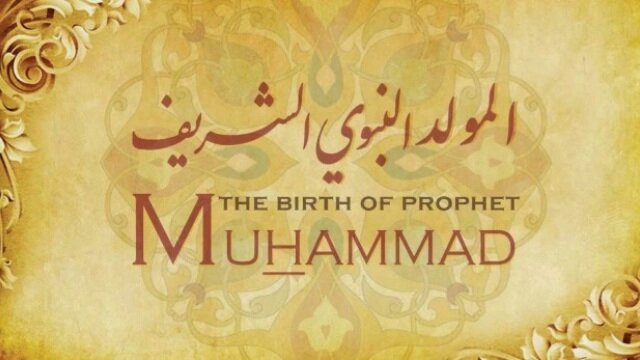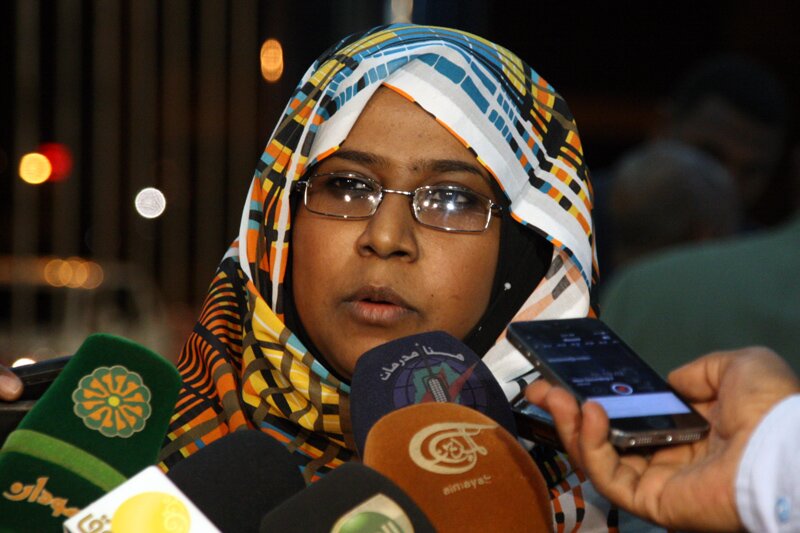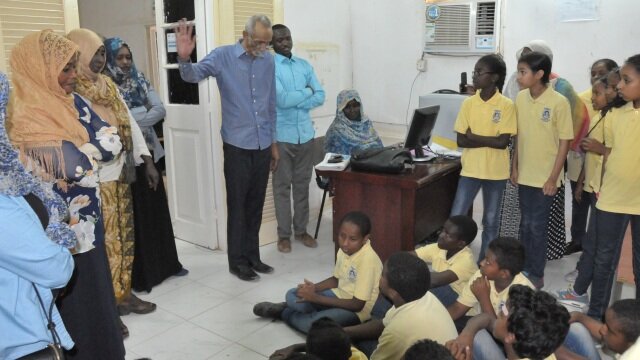
Welcome by the Lantern Who Illuminated the Universe (Episode Six – Prophet’s Cosorts Responsibilities II)
Nowadays we are inhaling the aroma of the descending blessings of the coming celebrations festivals of (Al-Mawled Al-Nabawi Al-Sharif) the anniversary occasion of the birth of our Master Muhammad Al-Mustafa PPBUH. (Al-Mawlid is a sufficient word to all Sudanese, because there no other Mawlid than; Mawlid Al-Rasoul salla Allahu Alayihi wa-sallam).
As a highly graded tradition we -the Sudanese- are celebrating with, acclamation Al-Mawlid festivals for a consecutive twelve days.
we would like to gain the honor of participation in this season by bringing up the phenomenon and some of the events in the universe which, if we look deeply into it, it tells us about the role our Messenger and Prophet, our master Muhammad Al-Mustafa (PPBUH) and his Message he promulgated, which are revealed in the Qur’an accompanied by some commentaries –if God Wills.
This episode is a continuation to the Prophet’s consorts, their extra responsibilities and duties. We would try to give small brief on the Great of the greatest women Al-Sayyida Khadiga Al-Kubra – the Great. At twenty five of his age –Muhammad Al-Mustapha [PPBUH] - was united in the holy bonds of wedlock with Khadiga the Great, the noble lady who befriended him when he had no worldly resources, trusted him when his worth was little know, encouraged and understood him in his spiritual struggles, believed in him when with trembling steps he took up the Call and withstood obloquy, persecution, insults, threats, and tortures. And she was a life-long helpmate till she was gathered to the saints in his fifty-first year. A perfect woman she is: THE MOTHER OF THOSE THAT BELIEVE.
When the veil was lifted from Chosen One’s eyes and his soul for a moment was filled with divine ecstasy, when this passed, and he returned to the world of Time and Circumstances and this world of Sense. He felt like one whose eyes had seen a light of a dazzling beauty, and felt dazed on his return to common sights. The darkness now seemed tenfold dark; the solitude seemed tenfold empty; the mount of Hiraa, henceforth known as the “Mountain of Light”, the mere shell of intense memory. Was it a dream? Terror seized his limbs and he straight way sought her who shared his inmost life, and told her of his sense of exaltation, and the awful void when the curtain closed. She understood, rejoiced, and comforted him; gave strength to his shaken senses; wrapped up in warmth his shivering body. Unused as yet to bear the strain and stress of an experience rare to mortal men, she knew it was no dream or delusion. She went and consulted her cousin Waraqa – a devout worshipper of God in the Faith of Christ- learned in spiritual lore. He listened, and with her rejoiced that he –Muhammad Al-Mustapha [PPBUH] - was God’s Chosen One to renew the Faith. She said to Muhammad Al-Mustapha [PPBUH]: “Blessed be you Chosen One! Do we not see your inner life – true and pure? Do not all see your outer life; kind and gentle? Loyal to your kinship; and you are Hospitable to strangers? No thought of harm or mischief ever stained your mind, nor did word ever pass your lips that was not true or stilled not the passions of narrower men. Ever ready in the service of God, you are he of whom I bear witness: there is God but He, and YOU ARE HIS CHOSEN APOSTLE.
We see it as revealed in Surat Al-Ahzab 33:
|
O’ Prophet (Muhammad PPBUH)! We have made lawful to you your wives, to whom you have paid their dowers; and those whom your right hand possesses out of the prisoners of war whom God has assigned to you; and daughters of your paternal uncles and aunts, who migrated (from Mecca) with you; and any believing woman who dedicated herself/soul to the Prophet if the Prophet wishes to marry her, a privilege for you only, not for the believers (at large). Indeed We know what We appointed/enjoined upon them as to their wives and captives whom their right hand possess; in order that there should be no difficulty on you. And God is Oft-Forgiving, Most Merciful. (50) |
يَا أَيُّهَا النَّبِيُّ إِنَّا أَحْلَلْنَا لَكَ أَزْوَاجَكَ اللَّاتِي آَتَيْتَ أُجُورَهُنَّ وَمَا مَلَكَتْ يَمِينُكَ مِمَّا أَفَاءَ اللَّهُ عَلَيْكَ وَبَنَاتِ عَمِّكَ وَبَنَاتِ عَمَّاتِكَ وَبَنَاتِ خَالِكَ وَبَنَاتِ خَالَاتِكَ اللَّاتِي هَاجَرْنَ مَعَكَ وَامْرَأَةً مُؤْمِنَةً إِنْ وَهَبَتْ نَفْسَهَا لِلنَّبِيِّ إِنْ أَرَادَ النَّبِيُّ أَنْ يَسْتَنْكِحَهَا خَالِصَةً لَكَ مِنْ دُونِ الْمُؤْمِنِينَ قَدْ عَلِمْنَا مَا فَرَضْنَا عَلَيْهِمْ فِي أَزْوَاجِهِمْ وَمَا مَلَكَتْ أَيْمَانُهُمْ لِكَيْلَا يَكُونَ عَلَيْكَ حَرَجٌ وَكَانَ اللَّهُ غَفُورًا رَحِيمًا (50) |
|
You [O’ Muhammad PPBUH] can postpone (the turn of) of whom you will of (your wives), and you may receive any whom you will. And whomsoever you desire of those whom you have set aside (her turn temporarily), it is no sin on you (to receive her again); that is better in sedentary and cooling of their eyes, and prevention of their grief, and the satisfaction for all of them with that which you will give them. And God Know (all) that is in your hearts; and God is All-Knowing, Most Forbearing. (51) |
تُرْجِي مَنْ تَشَاءُ مِنْهُنَّ وَتُؤْوِي إِلَيْكَ مَنْ تَشَاءُ وَمَنِ ابْتَغَيْتَ مِمَّنْ عَزَلْتَ فَلَا جُنَاحَ عَلَيْكَ ذَلِكَ أَدْنَى أَنْ تَقَرَّ أَعْيُنُهُنَّ وَلَا يَحْزَنَّ وَيَرْضَيْنَ بِمَا آَتَيْتَهُنَّ كُلُّهُنَّ وَاللَّهُ يَعْلَمُ مَا فِي قُلُوبِكُمْ وَكَانَ اللَّهُ عَلِيمًا حَلِيمًا (51) |
|
It is not lawful for you (to marry more) women after this, nor to change them for (other) wives, even though their beauty attract you –except any of your right hand should possess (as handmaidens): And God is Ever a Watcher over all things. (52) |
لَا يَحِلُّ لَكَ النِّسَاءُ مِنْ بَعْدُ وَلَا أَنْ تَبَدَّلَ بِهِنَّ مِنْ أَزْوَاجٍ وَلَوْ أَعْجَبَكَ حُسْنُهُنَّ إِلَّا مَا مَلَكَتْ يَمِينُكَ وَكَانَ اللَّهُ عَلَى كُلِّ شَيْءٍ رَقِيبًا (52) |
COMMENTARY:
(VERSE 50)- A) the first part of this verse introduces no new exemption or privilege. The verses 50-52 merely declare the points in which –on account of the special circumstances- concerns the Prophet’s marriages; the Prophets marriages differed from those of ordinary Muslims (as in verse 28 previously mentioned). This is considered in four heads, which we shall examine in the following four notes. B) Head 1, Marriage with dower (Surat Al-Nisa’ 4 verse 4): this is the universal Muslim marriage. The difference in the Prophet’s case was that there was no limitation to the number of four (S. Al-Nisa’ 4 verse 3), and women of the People of the Book (S. Al-Maida 5 verse 6) were not among his wives, but only Believers. These points are not expressly mentioned here, but are inferred by his actual practice. Obviously women who are expected to instruct other women in Islam must be Muslims. C) Head 2: Women (who are) Prisoners of War; the same remark as in the last note. The point does not now arise, as the whole conditions and incidents of war have been altered and slavery has been abolished by international agreement. D) Head 3: The first cousins, and not within the Prohibited Degrees of Marriage (see Surat Al-Nisa’ 4 verses 23-24). These are specially mentioned here by way of limitation. None of them could marry the Prophet unless she had preformed the Hijra with him. If she had not so performed it -in spite of her close relationship- she could not be credited with any great fervor for Islam, or be considered suitable for instructing women in Islam. E) Head 4: A believing women who dedicates her soul to the Prophet; obviously this case –like the last- is only applicable to the Prophet, and it is hedged round with the limitation that the Prophet considered it a suitable and proper case of true service to the community and not merely a sentimental woman’s freak; and this is especially applicable to the Great Lady Zainab bint Khuzaima, who had dedicated herself to the poor and was called the Mother of the Poor (UMM AL-MASAKIN). Similarly the last head might possibly refer to Zainab bint Jahsh, who was a daughter of the Prophet’s paternal aunt, herself a daughter of ‘Abdul-Muttalib. F) The ordinary Muslim marriage Law will be found chiefly in (Surat Al-Bagara 2 verses 221-235, Al-Nisa’ 4 verses 3-4+19-25+ 34-35, and Surat Al-Maida 5 verse 6). G) Marriage is an important relationship –not only in our physical life- but in our moral and spiritual life, and its effect extends –not only to the parties themselves- but to the children and future generations. A number of special problems arise according to special circumstances. Every man and woman must seriously consider all sides of the question and must do the best in his or her power to temper instincts and inclinations wisdom and guidance from God. God wishes to make every one’s path easy, for He is indeed “Oft-Forgiving, Most Merciful.”
(Verse 51) A) In Surat Al-Nisa’ 4 verse 3 it is laid down that more than one wife is not permissible “if you fear that you shall not be able to justly with them”. In a Muslim household there is no room for a “favorite wife”. In the special circumstances of the Prophet there were more than one, and he usually observed the rule of equality with them, in other things as well as in the rotation of conjugal rights. But considering that his marriages after he was invested with the Prophetic office were mainly dictated by other than conjugal or personal considerations (see verse 28 – Surat Al-Ahzab), the rotation could not always be observed, though he observed it as much as possible. This verse absolves him from absolute adherence to a fixed rotation. B) Where the rotation was for some reason interfered with –it was permissible- by another interference with the usual rotation, to bring satisfaction to one who had been previously set aside. This was not only permitted, but commended, and tending to remove dissatisfaction and cheer and comfort the eyes and hearts of those who were disappointed in their turn. C) Cooling the Eyes: an Arabic idiom for cheering and comforting eyes which yearn to see those they love. D) There was not much in the way of worldly goods or satisfaction that the Prophet could give them (see verse 28 from Surat Al-Ahzab 33). But he was kind, just, and true, that the best of men to his family, and they all clung to him. E) Our human hearts, however well on the whole, maybe yet –in their motives- have possibly some baser admixture. The feminine hearts are not more immune in this respect than the masculine. But everything is known and understood by God, Who will in His mercy make all allowance for our human weaknesses. His title of “Most Forbearing (Halim)” also gives His devoted worshippers the cue: why should we not also forbear with the faults and weaknesses of our neighbors and fellow creatures?
(Verse 52) This verse was revealed in year 7 A.H. After that the Prophet did not marry again, except the handmaiden Mary the Coptic, who was sent as a present by the Christian Muqauqas of Egypt. She became the mother of Ibrahim, who died in his infancy.
-
The Spirit of an Anniversary in Preparation for Another Century
-
Presidential Assistant Directs to Consolidate Popular Diplomacy with...Next >



